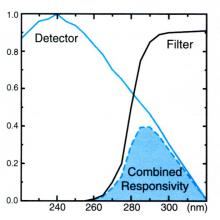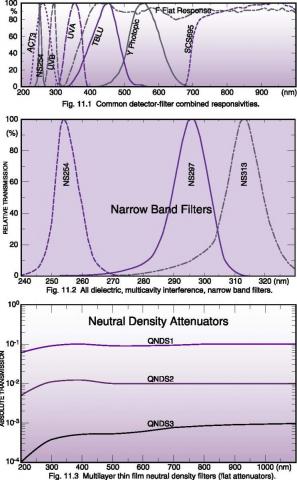Choosing a Filter (Chapter 11)
Spectral Matching

A detector’s overall spectral sensitivity is equal to the product of the responsivity of the sensor and the transmission of the filter. Given a desired overall sensitivity and a known detector responsivity, you can then solve for the ideal filter transmission curve.
A filter’s bandwidth decreases with thickness, in accordance with Bouger’s law (see Chapter 3). So by varying filter thickness, you can selectively modify the spectral responsivity of a sensor to match a particular function. Multiple filters cemented in layers give a net transmission equal to the product of the individual transmissions. At International Light, we’ve written simple algorithms to iteratively adjust layer thicknesses of known glass melts and minimize the error to a desired curve.

Filters operate by absorption or interference. Colored glass filters are doped with materials that selectively absorb light by wavelength, and obey Bouger’s law. The peak transmission is inherent to the additives, while bandwidth is dependent on thickness. Sharp-cut filters act as long pass filters, and are often used to subtract out long wavelength radiation in a secondary measurement. Interference filters rely on thin layers of dielectric to cause interference between wavefronts, providing very narrow bandwidths. Any of these filter types can be combined to form a composite filter that matches a particular photochemical or photobiological process.


Request Light Management Handbook as PDF (ALL Chapters)
Chapter 11 - The Light Measurement Handbook
Copyright © 1997 by Alexander D. Ryer
All Rights Reserved.
No part of this publication may be reproduced or transmitted in any form or by any means, electronic or mechanical, including photocopying, recording, or any information storage and retrieval system, without permission in writing from the copyright owner. Requests should be made through the publisher.
Technical Publications Dept.
International Light Technologies
10 Technology Drive
Peabody, MA 01960
ISBN 0-9658356-9-3
Library of Congress Catalog Card Number: 97-93677
Explore more light measurement resources
- Light Meters, Lux Meters & Radiometers
- UVC Light Meters
- UV & UVC LEDs
- Light Meter Calibration
- Spectrometers & Spectroradiometers
- Light Measurement Detectors
